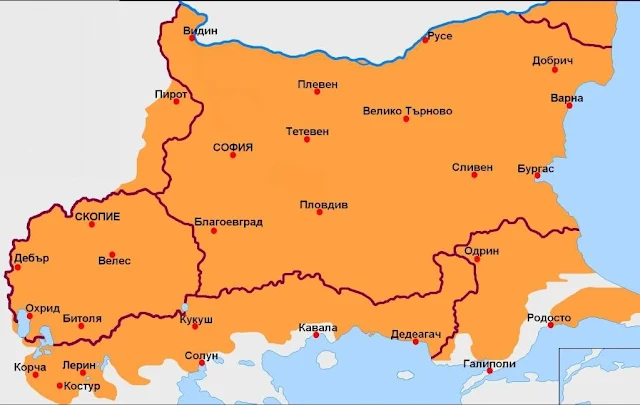The Battle of Pliska which is better known in Bulgaria as the Battle in Vъrbitsa Pass (Bulgarian: Битката във Върбишкия проход) was a series of battles between Bulgaria governed by knyaz Krum, and troops gathered from all parts of the Byzantine Empire led by the Emperor Nicephorus I Genik. The Byzantines plundered and burned the Bulgar capital Pliska which gave time for the Bulgars to block passes in the Balkan Mountain that served as exits out of Bulgaria. The decisive battle took place on July 26, 811, in some of the passes in the Eastern Balkan Mountain, most probably the Vărbitsa Pass. There, the Bulgars used the tactics of ambush and surprise night attack to effectively trap and immobilize the Byzantine Army, thus annihilating almost the whole army, including the Emperor. After the battle, Krum encased Nicephorus's skull in silver, and used it as a cup for wine-drinking. This is probably the best documented instance of the custom of the skull cup.
The distribution of Slavic languages may be visualized by a chain of circles that cross and intermingle so that many transitive dialects arise. In this Slavic chain, Bulgarian is the south-most link which is located between Serbian and Russian. Because the interactions between Bulgarian and Serbian, on one hand, and between Bulgarian and Russian, on the other, are not equivalent, the similarities of Bulgarian to Russian and Serbian are not the same. While Bulgarians and Serbs lived very close to each other for a very long time on a long borderline, the connection between Bulgarian and Russian took place on a narrow strip along Dobrudzha which was populated with other foreign peoples and was interrupted by the wide and scarcely populated Danube delta. The relatively large similarity between Bulgarian and Russian can be explained by the former Russian-Bulgarian neighbourship in the old homeland of Bulgars and Bulgarian Slavs and with subsequent loans between Bulgarian and Russian.



















